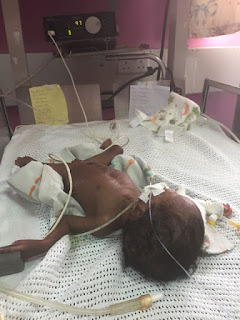Imagine yourself in S's life, which is what story and empathy and being human are all about.
S is 27 years old, and in her 6th pregnancy. The first four pregnancies all ended in sorrow-a miscarriage at 3 months, then still-births or immediate-deaths at 5, 6, and 7 months of gestation. She had one live baby after that who is now 2 years old, but after all that loss she feels the strain on her marriage of what is perceived to be her reproductive failure, and she was eager to have another. Being Rh negative and high risk, she started going for prenatal care to a church hospital. But Thursday night, suddenly, labor pains started. She had only completed 26 of the 40 weeks a baby needs to grow. She and her husband got a vehicle to take them towards the hospital, but the baby was born on the way in the car. So they stopped at the first place they found, another church-based hospital near the highway that is only equipped for very basic care. They wrapped the baby in blankets, put the mom and baby in an ambulance, and sent her on to her original destination, about five miles further on. The ambulance pulls in, but the staff comes out to say that there is no room at the inn so to speak, all the incubators are occupied, so they never even get out of the ambulance. This church hospital like most "private" but outreach-oriented places in Kenya has seen a 50% increase in admissions. They are stretched to the bursting point, and have made the agonizing decision that they will not admit beyond their bed capacity, which would put the patients they already have at risk. It's widely known that Naivasha is one of the only government facilities trying to stay functional, so they are told to go try there. By the time they arrive it's about 2:30 am. The baby is cold, gasping for breaths. Nurses set to work warming him and starting CPAP. All the incubators are occupied here too, but for better or worse they have no limits on capacity. He seems to respond for a few hours.
I arrive Friday about 8-something whisking into Nursery with efficiency, because I have some sick babies, some high levels of jaundice, and I've prepared all my paperwork and blood tubes the day before for getting samples to lab early. If I can get the blood in by 9 and start rounds, there's a chance I can see the results by mid day in time to make adjustments to therapy. The night nurse is just leaving, and casually mentions there's a new 1 kg baby who she's been resuscitating, but his oxygen saturations are in the 40's % (normal = 90-100%). I hear the weary defeat, and while I wish she'd called, they know and I know that I can't come in every day and every night, so I feel like they shield me especially when it looks hopeless. 26 1/2 week babies have a very low survival anywhere but Kijabe, probably Tenwek, or a large Nairobi private expensive hospital.
Nevertheless, this little guy has a heart rate and responds to touch and my efficiently anticipated Friday goes out the window. It takes me almost a full hour to persistently and gently bag the saturations up over 90. His lungs lack surfactant, a lubricant that keeps them open, and with the low oxygen levels the blood vessels in the lungs also clamp down. It seems miraculous when they somehow open after all the effort, and he gets pink. A nurse has tried an IV but his veins are like strands of hair, so small, that even that effort has left his arm badly bruised. Umbilical catheters are not really done here, but remembering "improvise" we find a pair of sterile gloves and open the package for our operating field, open a sterile blade and a suture that was in the cabinet, and a sterile ng feeding tube. I swab his abdomen with betadyne and hope for the best, because he's now over 8 hours old with no fluids, no dextrose, no antibiotics. Turns out it is possible to suture and to place a line with only your fingers in sterile gloves (no instruments). Now we give the dextrose and antibiotics and put him on CPAP with a heater near by. It's now well into the morning, and I notice that our nurse is all alone with this sick baby and about 20 others.
Because the nurses have gone on strike too. They had come back based on promises from the county government that did not materialize by the end of the month of January, so they didn't show up Friday. Meaning only a contract (temporary) nurse covered the unit alone. The mom who came from Nairobi to get her C-section for her preem who had stopped moving much (after losing a baby last year in the same scenario) can read and write, so she takes over weighing all the babies and recording their weights. It's a crazy day, back and forth between the Nursery and the ward. By 4 pm we hear that the nurses will return, so the wards won't be totally empty at night. Whew.
Somehow the tiny, early premature boy plugs along through the day Friday, and the night. His saturations stay at 98-100% in spite of very immature stiff little lungs. His mom S., who had been counseled that he was dying, gets a little bit hopeful. She names him Blessing. Which just goes to show that there are people in this world with faith greater than we can imagine.
I've texted with the lone night nurse so I know he's still alive as I arrive Saturday, and I'm starting to hope too. Maybe he'll be a fighter. Surely the dramatic turn of yesterday morning means something. But this morning he looks cold, with a heart rate in the 90's which is rather low for someone this size. Being on a non-functional resuscitation bed covered with blankets next to a heater (see top photo) just isn't working well. Our three incubator choices are underheat, no heat, and overheat. I choose overheat and we move babies around. But when he's put in the incubator, his condition plummets. Again I bag, but this time in an hour he's barely touched the 90 range once. I ask his mom to put her hands on him for warmth and prayer. We stand side by side, me leaning into the incubator trying to keep oxygen going in and out of his lungs, watching the numbers on our single monitor. This mom asks about any medicine that can help, and we talk about her sending someone to Nairobi for surfactant, which I might be able to find a way to give (again, the moms who meant to go elsewhere but land at Naivasha are quite different from the vast majority who get care here, for whom a $130 vial of surfactant would be over two month's of income, impossible). There are a couple of moments when I think we might make it . There is another when I am completely alone with the babies, and I lean my head down on the incubator and cry a bit, I am so tired. I go for an hour and 45 minutes with diminishing returns. This would be her fifth loss, and I want to give it our all, and yesterday the baby responded, but today I feel punched back by evil. Finally about 11:30 am, mom has gone to rest, and I give up. The sats have sunk into the 20's. His brain is almost certainly not recoverable now. The lone nurse (no strike today, but only one working) puts the CPAP back on. Within five minutes, he's dead.
Baby Blessing might have lived if the strike was not on. His mother might have had closer follow up. She might have reached her better hospital sooner. When she did reach, they probably wouldn't have been so overwhelmed, they would have had space or made space for one of their own prenatal-care patients. Our NSCH would have had more nurses, and interns on call. His life was a long shot, but his death was certainly hastened by the strike impact. And he happened to be living within an hour of the limited available care. If he'd been born beyond the small radius of accessibility to a church hospital or the minimally functional Naivasha or Nakuru, he would have died the first night, which must certainly be true of multiple preemies per day over the rest of the country.
S. cried when we told her, but she also expressed her trust in God. The death, for her, like many women here, is only one part of a larger picture of expected fertility, family pressure, a sense of failure and desperation. My nurse was excellent, counseling her to rest, to take time before getting desperately pregnant again. We both talked about our own losses and families and ages at delivery, which gave her some hope. As defeated as I felt when Blessing died, and the rest of the day's work loomed still ahead, even I felt better after praying with the nurse and the mother. I had so wanted God to intervene, to dramatically save this boy, because his mom had been through too much grief.
And, if I'm honest, because I needed the emotional boost too. It's been a death a day this week. A severely malnourished child with previously undiagnosed AIDS. Another baby with AIDS. A toddler with the severe viral syndrome we're seeing. Another preem born before getting to the hospital, cold and septic. Blessing. Others who are alive are scarred forever. We had a baby abandoned in the market, two babies starving at their mothers' empty breasts, a 9-year-old beat so badly by her teacher that she couldn't move her arm, a 5-year old raped by her stepfather. In the news another child to our north was "caned" by the teacher then the whole class was enjoined to beat her, to shame her inability to read, and she actually died. It's a broken world out there. The government is paying themselves salaries that are more than a hundred times higher than the parents' of my patients, and can't come to a solution for the public health system. The doctors refused a major raise, holding out for the tripling of their salaries.
How does one live in such a world?
My Bible reading this morning took us to the close of 1 Corinthians. Paul writes, "come, Lord Jesus." We ask for God's merciful presence right here with the suffering; we ask for God's justice to shake up the principalities and powers that wield evil broadly and to sanctify our own evil hearts. And while we wait for that coming, here is Paul's advice:
Keep alert, stand firm in your faith, be courageous, be strong. Let all that you do be done in love.
Those are words to live by. Please pray we would be alert to God's mercies, see that His goodness which far outweighs the sorrow, like the baby below who is peacefully sleeping and growing. Truly the vast majority of our patients have happier stories. Pray we would stand firm in faith when every day carries uncertainty of what we will face and with how much (or how little) help. That we would be courageous and strong, like our Ranger School son who made it through the first (and hardest) week. Months still to go though. And mostly, that all we do would be done in love. Not for political statement or for stubborn duty or for personal satisfaction, but for love of God and His world.


































